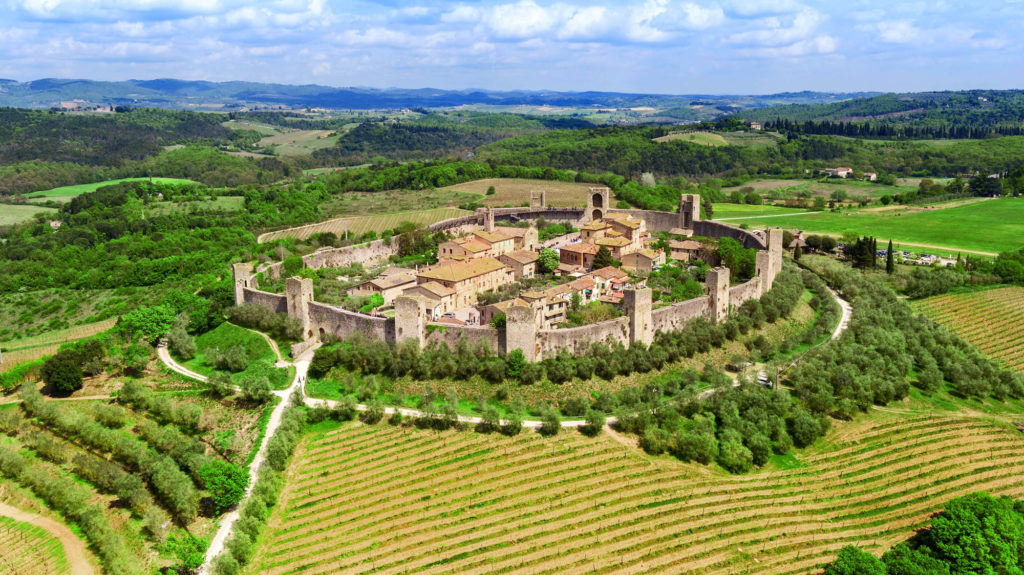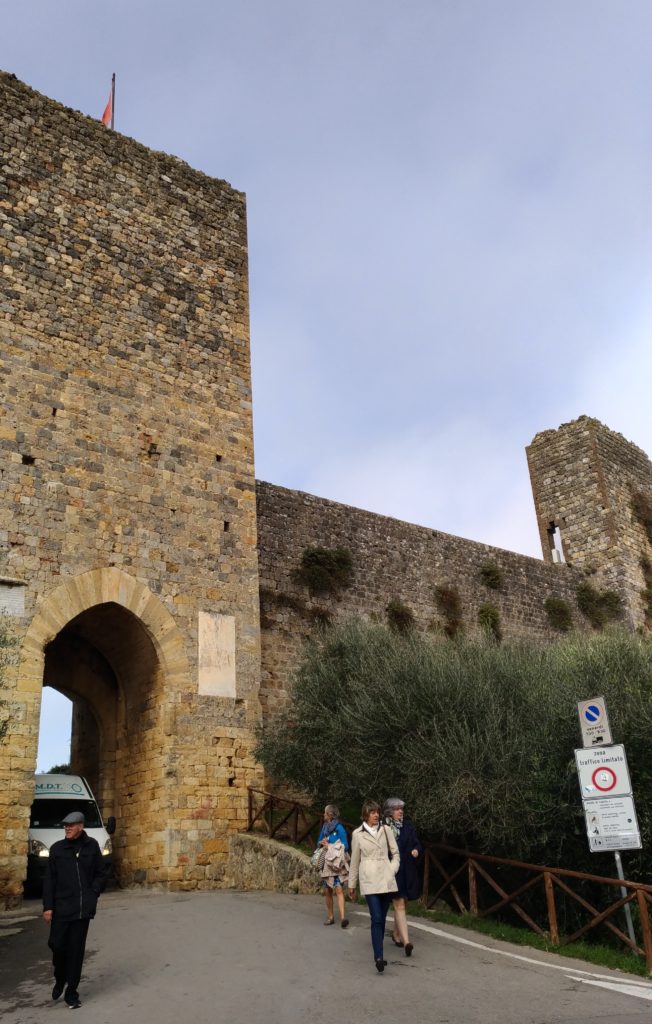Enter through the narrow gate; for the gate is wide and the way is broad that leads to destruction, and there are many who enter through it. For the gate is small and the way is narrow that leads to life, and there are few who find it.
Matthew 7:13-14

It’s no secret that one of my favorite places in the world is Tuscany, Italy. There is one town that is of particular interest to me – Monteriggioni. It is a very small town situated on a hilltop about 20 km northwest of Siena and an hour south of Florence, the home of one of Italy’s greatest poets, Dante Alighieri. Monteriggioni is known for its midieval fortress design with a wall that encloses the town and its high watchtowers. There is a singular road that encircles the town, and only a single road through a single gate that allows entrance. The commune and its majestic watchtowers were the inspiration of the circle of giants that protected the entrance to Hell in Dante’s masterful work “Inferno”, part of his Divine Comedy trilogy.
Monteriggioni is not a town that many people immediately think of when they consider their travels to Italy. The flashier fashion mecca of Milan, the historical center of the Roman Empire in Rome, the Grand Canal of Venice, and Renaissance muses of Florence all draw far more attention to the holiday traveller. Even Siena and Pisa draw more attention in the Tuscan region than this quiet little out of the way hilltop paradise that sits less than a mile from the main road. But those who visit often stand in awe of the the majestic beauty of its ancient walls and view of the quiet, serene Tuscan valley.

The entrance gate to Monteriggioni, also known as the Porta Franca, is quite narrow to enter. In fact, it is so narrow, that a motorized vehicle can barely fit through the entrance, so most automobiles are forbidden entrance and must park outside of the fortressed community. The only vehicles allowed inside of the town are official vehicles for emergency services. In medieval times, entrance to the town was only allowed with the permission of the city magistrate/authority. And I can’t think of a more beautiful illustration of what it means to enter the gates of the Kingdom through “the narrow gate.”
I’ve once heard it said that the fact that there is a “highway to Hell” and a “stairway to Heaven” says a lot about the population at the destination. What makes entrance into the Kingdom of God so difficult is not so much the path, but rather the choice and the requirements for entrance. You can see a narrow gate from a distance and recognize whether or not you can fit through it, and many once faced with this decision choose instead an easier, more comfortable doorway – a doorway that appeals to pride and self-sufficiency. The path to such a doorway is wide and smooth without a steep climb that requires effort.
But the path to the entrance to the Kingdom is narrow. It’s difficult and prone to stumbling. It’s a climb up a hill, on top of which stands a cross. The cross of the hill of Golgotha. The crucifixion cross of Christ, upon which is nailed my sin and yours. It is by that cross that God fulfills the promise to “destroy the wisdom of the wise and the cleverness of the clever.” (1 Corinthians 1:19)
An allegory that I use for the cross is this illustration: it is the intersection of God’s judgement, from the heights of His holiness to the depths of our lowliness, with the crossbeam of His love, where His arms are forever stretched out waiting to embrace you. This picture of grace is not an easy one to accept because our human nature and humanistic philosophies require human effort, but with limited sacrifice. Humanism appeals to human pride by elevating mankind to the point of godhood.
One of the great champions of humanistic thought was Lorenzo de Medici, “Il Magnifico”. Lorenzo the Magnificent was known for his patronage of the arts and was widely credited for funding what is known today as the Italian Renaissance that spawned such masterful artists as Sandro Botticelli, Leonardo da Vinci, and Michaelangelo Buonorotti. However, it was his pride that ultimately led to his own downfall. Hannah S. Bowers, historian and blogger, writes “Lorenzo used his charm and perceptive leadership to pursue his own desires. In the end, he was viewed by contemporaries as Plato’s ‘perfect man’.” It was these virtues that led to his lust for power and resulted in numerous attempts on his life and his own estrangement from faith in God. It was this humanistic philosophy that led to corruption within the church as numerous Popes, including two of the Medici clan, were guilty of corrupting the faith in the name of their own lust for power.
It was this corruption that led to the rise of Girolamo Savanorola, a fiery monk who sought to end the corruption within the church and within Florentine government and destroyed many priceless works of art that were funded by the blood money of the church and the Medici in his famed Bonfire of the Vanities. In the end it was his own lust for power driven by his own pride that led to his downfall and eventual execution in the Piazza Signoria.
However it was this corruption of the church and the mistakes of Savanorola that reached the ears and inspired the heart of a German monk named Martin Luther to seek reformation. It was not his heart to form a new Protestant religion, but rather to redeem the heart of the Catholic church. But the pope of the day allowed his own pride to prevent repentance and Luther refused to recant his message of judgement and grace that is available by faith, rather than indulgences at the will of the prideful, religious elite.
But the gate to the Kingdom is a simple, unassuming gate. It simply beckons you to enter, but it requires laying aside your pride and submitting to the authority of God. It requires taking a step of faith to climb the hill of Calvary and bowing at the foot of the cross. It requires leaving behind the easy path of the highway and taking the path that is difficult, the path of obedience. The path of faith. And it is not an unreasonable or blind faith.
Paul encourages us to “Not be conformed to the ways of this world, but be transformed by the renewing of your mind, so that you may prove what the will of God is, that which is good and acceptable and perfect.” (Romans 12:2) Our discipline starts with our mind, transforming the way that we think of this world. Recognizing that our way has lead to our own destruction for too long and that it is time that we try a new way. A more difficult way, but a more rewarding way. An impossible path on our own, but a path that He will walk with us because in the end, He is the gate. He is the door. He Himself is the entrance to the Kingdom. He beckons you to lay aside your pride and your self-sufficiency and rest in Him. Today and forevermore.